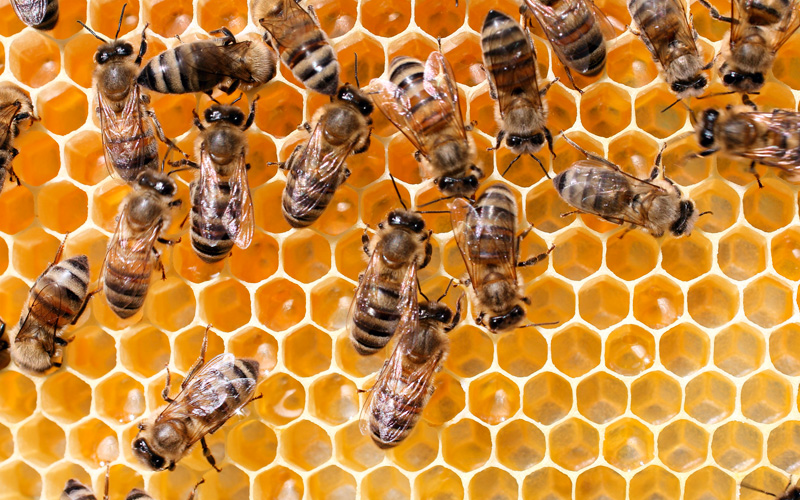
by guest blogger “Coach” Mark Smallwood, Rodale Institute executive director
Honeybees are the only insects to produce food eaten by humans. To make just one pound of honey, worker bees have to fly 55,000 miles and tap 2 million flowers. Each honeybee’s wings beat about 200 times per second, creating their infamous buzzing.
Throughout history, countless cultures and civilizations have venerated the bee. Aegean cultures believed bees were a bridge from the natural world to the underworld. Records from 2500 BC show honeybees carved into ancient Egyptian hieroglyphs. Honey was revered as a medicine, and when excavating pharaohs’ tombs, archeologists have uncovered jars of honey buried alongside these leaders.
Sadly, today, honeybees have lost their place of prominence in our society. They’ve been drawn into industrial agriculture, and each year, hundreds of thousands of their hives are shipped from coast to coast, providing pollination for everything from almonds to zucchini. This system focuses on the economic value of the bees and disregards the life of the creature. We’re no longer taking care of the bees—they’ve become a commodity, much as the cattle raised for beef in concentrated animal-feeding operations (CAFOs) or crops of genetically modified (GMO) corn are.
For the past 70 years, the number of honeybee colonies in the U.S. has steadily declined: In the 1940s, there were 7.5 million colonies nationwide; today, there are only 2.5 million—that’s 250 billion fewer honeybees. Clearly, if honeybees are any indication of the health of the environment, they are sounding a warning to us all.
At Rodale Institute, we believe the backyard beekeeper is the key to honeybee health. Which means we need more hobby beekeepers.
I’ve been a beekeeper for nearly 20 years. As a beekeeper who cares a lot about my bees, part of my goal is to share my passion for bees with others. Over the years, I’ve introduced a number of colleagues and friends to beekeeping: Stefano from Azure Bees; Adam from Whole Foods Market; and, most recently, Michael from Rodale Institute. Each of them has described beekeeping as a meditative, spiritual experience that has taught him patience and trust and has increased his belief in the value of hard work. Working with the bees has changed their lives for the better.
When I welcome new employees to the Rodale Institute, I share with them the history of our organization and our core values and mission. To impress upon them the importance of our work, I relate our planet to a bee’s hive: We are the stewards of this planet, much as the bees are the stewards of their own colony.
After a bee stings, she dies. She only gets one chance to make this sacrifice for the hive.
We humans are lucky. We get many chances to protect and preserve our hive, our colony, this planet we share with so many amazing creatures.
At the end of each meeting, I ask my team, “What is your sacrifice? What will you do today to protect, strengthen, and preserve our hive?”
It’s up us to “bee” the solution.
My tips for healthy hive stewardship:
My beekeeping philosophy is focused on preservation versus production, respect for the bees, and trusting my intuition when dealing with them.
1. Find a mentor who fits your beekeeping values. I recommend that you never feed your bees sugar and avoid all antibiotics and chemical treatments. Each spring, Rodale Institute holds a two-day workshop on backyard hobby beekeeping. Check our online calendar for dates.
2. Many beekeepers use smoke when entering the hives—they believe it calms the bees. I do not. I know how I feel when someone blows smoke in my face—and I only have two “scent receptors.” Bees have 170. After they are “smoked,” it takes up to two weeks for them to regain full use of their scent receptors.
3. Bees get a bad reputation for stinging, but most “stings” are actually bites from wasps or hornets. Bees are industrious and focused on pollination. Traditionally, they won’t sting unless they feel threatened.
4. When purchasing bees, make sure to find a local source. Check with other local hive stewards to ensure that your breeder is respected and that you’re getting a calm strain of bees.
5. Be present with your bees, but don’t overwork them. During the warm weather, when bees are most active, check on your hives about once a month. Bees can actually begin to recognize your shape—they will get to “know” you as you continue to work with them.
6. Make sure your bees always have a clean source of water.
7. Don’t take too much honey—especially in the fall. The bees need the honey as food to survive the winter. The National Honey Board has selected September as Honey Month. In my opinion, that’s all wrong. July should be Honey Month—having it in midsummer gives the bees time to build up their reserves before winter sets in. Our team at Rodale Institute is working with Wedderspoon, an organic honey company, to increase awareness about honey—and get Honey Month changed!
 “Coach” Mark Smallwood has been dedicated to environmental sustainability, efficiency, and conservation for decades. Since joining Rodale Institute in December 2010, he has brought heritage livestock back to the institute’s 333-acre farm; expanded and enhanced its research efforts; and launched Your 2 Cents, a national campaign to support and promote new organic farmers. In recognition of his sustainability efforts, Coach was chosen as a messenger for Al Gore’s Climate Project, presenting to more than 15,000 people on the effects of global warming. Last, but certainly not least, as a longtime organic farmer and biodynamic gardener, Coach has raised chickens, goats, sheep, and pigs and driven a team of oxen.
“Coach” Mark Smallwood has been dedicated to environmental sustainability, efficiency, and conservation for decades. Since joining Rodale Institute in December 2010, he has brought heritage livestock back to the institute’s 333-acre farm; expanded and enhanced its research efforts; and launched Your 2 Cents, a national campaign to support and promote new organic farmers. In recognition of his sustainability efforts, Coach was chosen as a messenger for Al Gore’s Climate Project, presenting to more than 15,000 people on the effects of global warming. Last, but certainly not least, as a longtime organic farmer and biodynamic gardener, Coach has raised chickens, goats, sheep, and pigs and driven a team of oxen.




Thank you, Mark, from the bottom of my heart for all you do for our bees!! Without them I don’t think we will survive for long. It touches me to know that they give their lives to protect their hives!! I wish we had that same dedication to what we should protect in our own lives. I hope all the people you teach to love their bees can help to keep our bees from becoming extinct!!